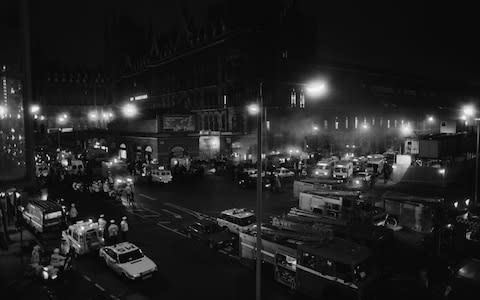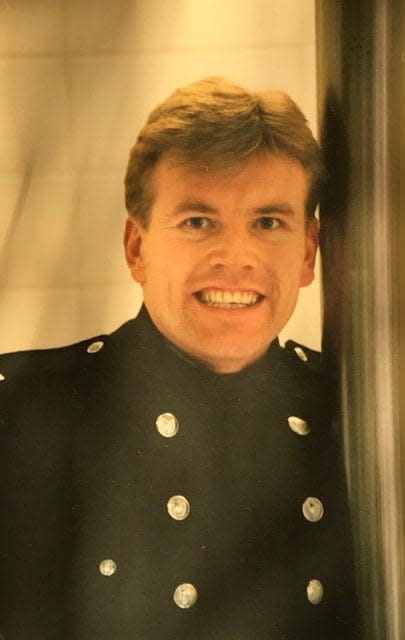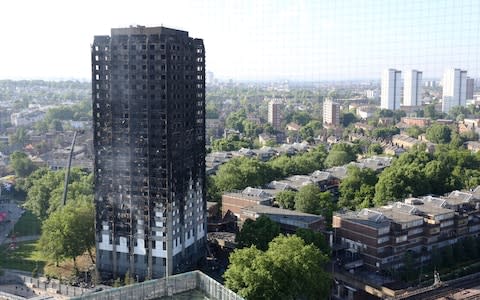Kings Cross fire: Thirty years on has anything really changed for our firefighters?

For ten years, Roger Kendall couldn’t go into the underground. He worked at a fire station in Soho, but would travel on foot or by motorbike - never on the Tube. For him, it hadn't felt safe since November 18, 1987, when, in the middle of rush hour, flames tore through the underground station at Kings Cross.
"I felt ill and started sweating any time I went near the underground, so I wouldn't go on it," says Kendall. "I avoided it, it didn't feel safe. It took me over 10 years to get back on an underground train."
The former firefighter was one of the first on the scene at the devastating Kings Cross fire, in which 31 people died and 100 were injured. On that night, 30 years ago today, he watched countless people be engulfed in smoke and found himself saying goodbye to his boss - and role model.
“When you’re faced with something like that, you always feel you could have done a bit more,” he says. “Even though you probably couldn’t.”
When Kendall, now 59, arrived at Kings Cross, at around 7:30pm on the mild Wednesday evening, the atmosphere was rather relaxed. “We pulled up out the front and were just having a chat. People were coming in and out of the subway, there was nothing untoward,” he says. Station manager Colin Townsley went down to investigate the small fire that had started on a wooden escalator, by what is believed to have been a match. “Back then a fire on an escalator wasn’t an unusual event, they happened quite a lot. It was just another call.”

But, without warning, that changed. A thick black cloud of smoke streamed from the tunnel and was followed by a surge of heat. “It just came from nowhere. Then we heard screams and people started to panic,” says Kendall, who was the lead firefighter on his engine.
The firefighters pulled people from the billowing smoke, which was so thick they couldn’t see their hands. Victims staggered out with burns and smoldering clothes that had recently caught fire. There was no sign of Townsley.
More than 30 fire engines soon came in from all over London. “It was unprecedented in those days,” says Kendall. “We had an underground concourse with no idea of how many people were trapped. And, obviously, there was a serious fire.”
Kendall was in charge of monitoring where his team were and how much oxygen they had in their tanks. Normally one person would control 12 firefighters at a time. He was overseeing 50. “It was extremely hot and dangerous,” he says.
After the blaze eased, Kendall’s firefighters started to emerge from the underground. He noticed a number of them had urinated themselves out of fear. What he didn’t see, though, was Townsley. “Before the flash happened he’d obviously read signs in the pattern of the smoke that something was going to happen, because he sent back the guys he was with,” Kendall recalls. “He was found with his arms around two people he was trying to rescue.”
Townsley had died, aged 45, leaving behind a wife and two teenage daughters. “It was just devastating,” says Kendall.

The London Fire Brigade is commemorating the 30th anniversary of the Kings Cross fire on Saturday. For many, the service will be dominated by the all-too recent memory of the Grenfell Tower fire, in which 71 people died, according to figures released this week.
“As firefighters our job is to fight fires and, grimly, that’s what we want to do,” says Lucy Masoud, a London firefighter and regional official for the Fire Brigade Union. “But something like Grenfell, when you have to deal with so many fatalities and victims, that is not a fire anyone wants to be at. Nothing could ever prepare you for that.
“My colleagues did an amazing job, they saved so many people. But they don’t think about who they saved, they only think about the people they had to leave behind. And it haunts them, they’ll never get over it.”

The fire service is known for having a macho culture and, after the Kings Cross fire, the fighters were widely expected to get by without additional support. “Back in the day there was a lot of black fire station humour and guys and girls were expected just to crack a few jokes in the mess and go back to their family,” says Kendall. The 150 or so firefighters who attended Kings Cross had access to one councilor; but most of them never visited her. “It was just one of the things you didn’t do. It was cultural, I guess, it was seen as a sign of weakness in a predominantly male environment. How bizarre.”
Kendall says when he was meant to be visiting the councilor he would go for a walk instead. He now realises how unhealthy this was. “One of the great ways the fire service has moved on is that there are counciling teams and people are much more aware of PTSD,” he says.
Although the boisterous culture prevails, Masoud says the service thinks about mental health as a priority. In the wake of Grenfell, London Fire Commissioner Dany Cotton said she was receiving counciling, which sent a message to the service that it was fine to need help.
Firefighters still sit around the mess table using dark humour to get one another through traumatic events, Masoud says, but they also look out for signs of alcoholism, depression and post-traumatic stress disorder (PTSD) in their colleagues. “A few years ago we didn’t really know how to deal with PTSD but now we’re a lot more aware of it,” she says. “There’s also a definite willingness from the brigade to be open about mental health.”
Firefighters’ uniforms have also improved dramatically since 1987, when they consisted of woolen tunics, plastic leggings and cork helmets. “The leggings softened when they were subject to heat and the wool absorbed water,” says Tom George, director of operations at the London Fire Brigade. “It was pretty impractical really. It was the same firefighting gear they wore during the Blitz.”

As well as updating its uniforms, the fire brigade became more proactive about preventing blazes. Smoking was banned on the underground and fire safety training become standard. Thanks to technology, firefighters now have thermal image cameras so they can see where heat is collecting and telemetry systems that monitor their movements in a blaze.
But, in some aspects, Londoners and firefighters are more at risk than ever. Cuts to the service three years ago led to six of the stations that responded to the Kings Cross fire closing down.
“If Kings Cross happened now, I believe the casualty list would be so much higher because there would be less stations who could attend to it,” says Masoud. “It’s absolutely nonsense, London should be getting safer not worse.
“Fire deaths have risen by a third. And that’s before Grenfell. If the government is serious about helping us they need to give us funding.”
Masoud adds that more councilors are needed to support those who responded to the Grenfell disaster. For one, she says, there should be emotional help on site during the four-hour long interviews firefighters are currently doing as part of the inquiry. “These fighters are being asked to relive the horrific things they’ve seen and experienced,” she says. “Of course going to have an impact on them.”

She also hopes, in the long term, that the Government will consider increasing the pay for firefighters. “We’re expected to live and work in London but we can’t afford to live in London”, she says. Masoud is one of only two firefighters on her Kensington watch who now live in the city.
George, from the London brigade, hopes things will change after Grenfell, namely for fire safety, and fighters’ well being. “Kings Cross was certainly a game changer for the fire sector as I’m sure Grenfell will be,” he says. “[For example], while counciling has been in the fire sector for a number of decades, Grenfell has certainly brought it to the fore.”
Soon after the Kings Cross fire had been extinguished, Kendall and his team were called to another 999 situation. “It was only a fire alarm going off but I was absolutely terrified,” he says. “But we thought it was the right thing to do.”
For the rest of his career, which ended in 2009 when Kendall retired from the fire service, he tried to live by Townsley’s example. “After all this time I still feel very proud to have been a firefighter and to have been able to give something,” he says.

